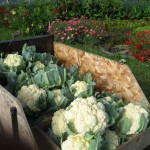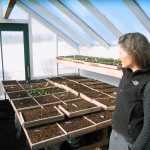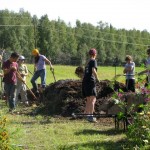Local farm is almost a magical place
May 3, 2011
by Nancy Tarnai
April 24, 2011
To see what Susan Kerndt and Eric Mayo do with one and a half acres of land is to witness what Technicolor did for movies.

A local horticulture expert described Wild Rose Farm, located off of Yankovich Road, as a fairy land, a truly magical place filled with colorful flowers and happy children.
The couple grows vegetables and herbs, operates a 40-member community supported agriculture business, sells produce to restaurants and runs a summer camp for hundreds of children. They raise bees, chickens, rabbits and fruit trees.
Kerndt has been trained in biodynamic farming, a system that started in 1924, based on lectures and publications by Rudolf Steiner, particularly his “Agricultural Course.” Steiner’s lectures taught that farms should be self-contained and self-sustaining.
“He promoted the farm as a living organism capable of maintaining our health and vitality,” Kerndt said. Probably the sole biodynamic farm in Alaska, Wild Rose is one of 185 in the U.S. “This method contributes to natural resources rather than taking away,” she added.

Wild Rose isn’t yet Demeter-certified (a prestigious label for organically produced foods) but Kerndt is working toward that. Limiting the use of plastic pots or imported potting soil is part of Kerndt’s philosophy. “We live in an environment with health problems and health issues. We can look at agriculture that is healing.”
Compost is the secret to Kerndt’s green thumb. Mixing old hay, vegetable waste and manure from the neighbors’ horse farm, she creates a substance that helps practically anything grow. “We have a lot of fun making compost,” she said. “My goal is to have as many teenagers learn how to make compost as possible. Mechanized composting would be great but we’d miss out.”

Kerndt grew up on a farm in Iowa and studied biology at Knox College in Galesburg, Ill. She worked at organic farms in Wisconsin, then came to visit her sister in Fairbanks. During an eight-year stint in Homer she met her future husband Eric and they came north 21 years ago to settle on the Mayo family land.
Deciding that a good way to teach children about sustainable food systems was to put them in a garden, the couple expanded the family garden and got their four children, Coty, Wyatt, Ema and Else, out there. When they were younger, each child had his or her own small plot to manage. “They learned practical living skills,” Kerndt said. “They learned about nature, seeds, planting, harvesting and cooking.
“All children should have access to a garden.” She took that notion to the extreme, hosting a summer camp at the farm for the past 11 years. Nearly 250 campers, ages 5 to 15, attend each summer.
For Kerndt the best thing about farming is knowing where the food comes from. “It’s clean; it’s organic; there’s not anything extra in it.”
Yet, as many people in agriculture will admit, farming is a lot of work, even if it’s good work. “I’m not sure the farmer is valued for his time, but when you look at it in perspective the food is cheap,” she said.

In addition to vegetable and salad shares, Wild Rose offers flower shares. Members can even go to the farm and pick their own bouquets from among the 100 varieties. Kerndt said about 70 percent of the farm is flowers.
Kerndt’s goal is to bring awareness to the community about the advantages of eating local. “I hope people will understand more about where their food comes from,” she said. “Local produce is so much better and it’s valuable for the economy and health.”
At the end of each summer Kerndt and Mayo host a gathering that attracts 300 to 400 people. “Our farm has a lot to do with people,” Kerndt said.
Contact info:
Wild Rose Farm
479-6363
kerndtmayo@alaska.net
www.wildrosesummercamp.com
This column is provided as a service by the UAF School of Natural Resources and Agricultural Sciences and the Agricultural and Forestry Experiment Station. Nancy Tarnai is the school and station’s public information officer. She can be reached at ntarnai@alaska.edu.


